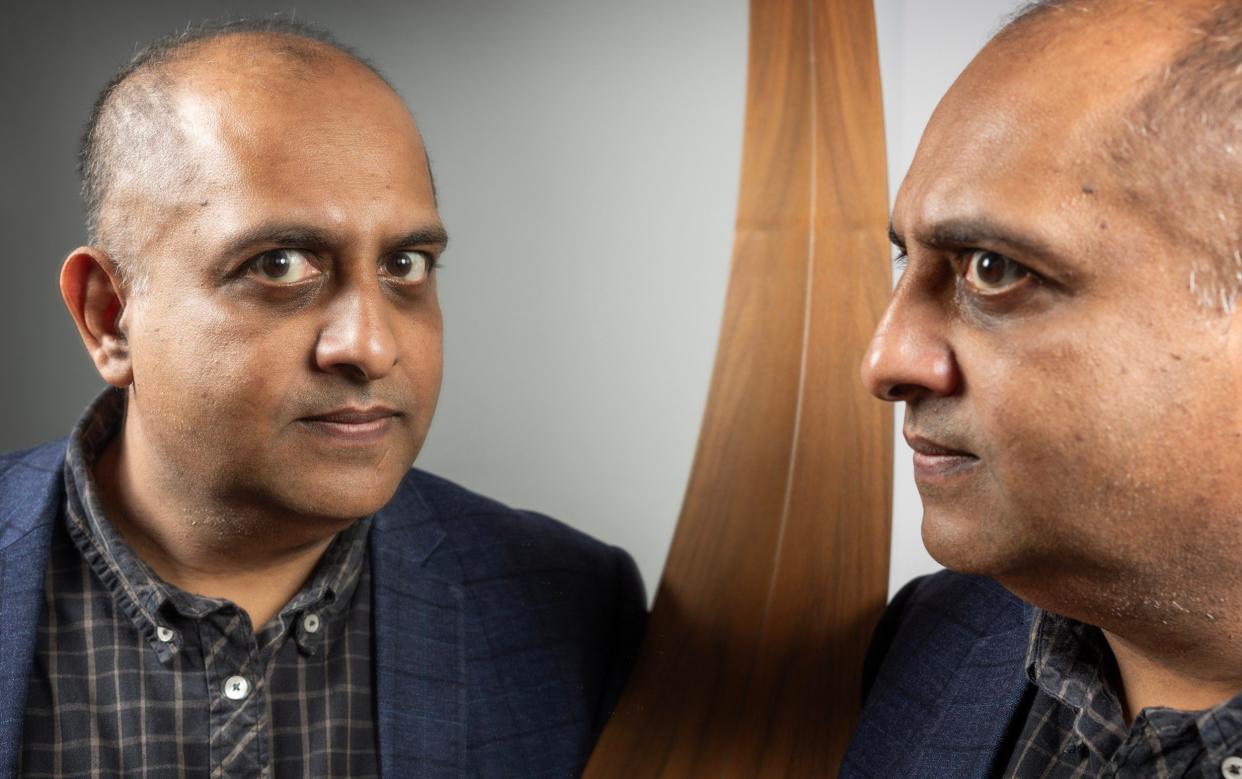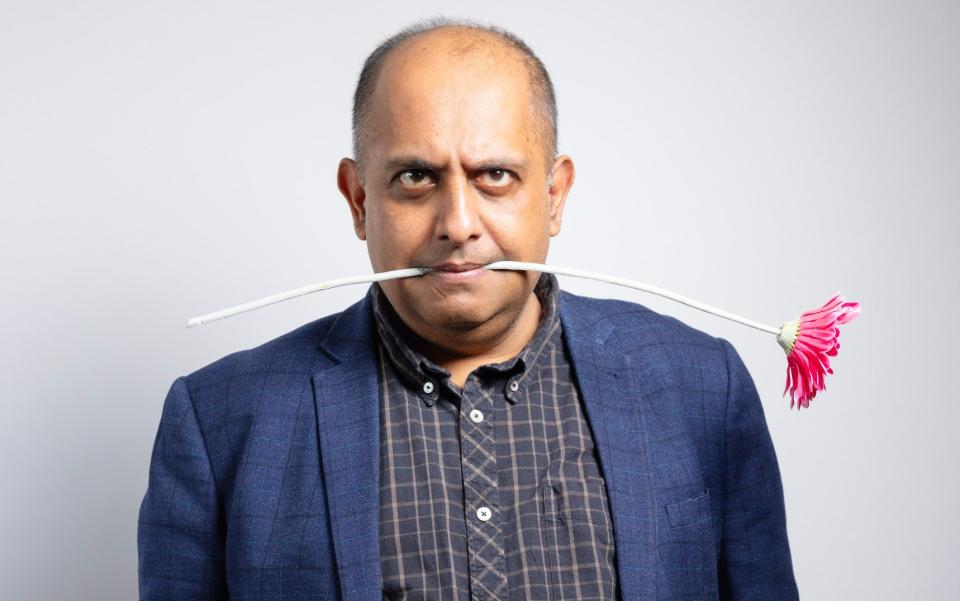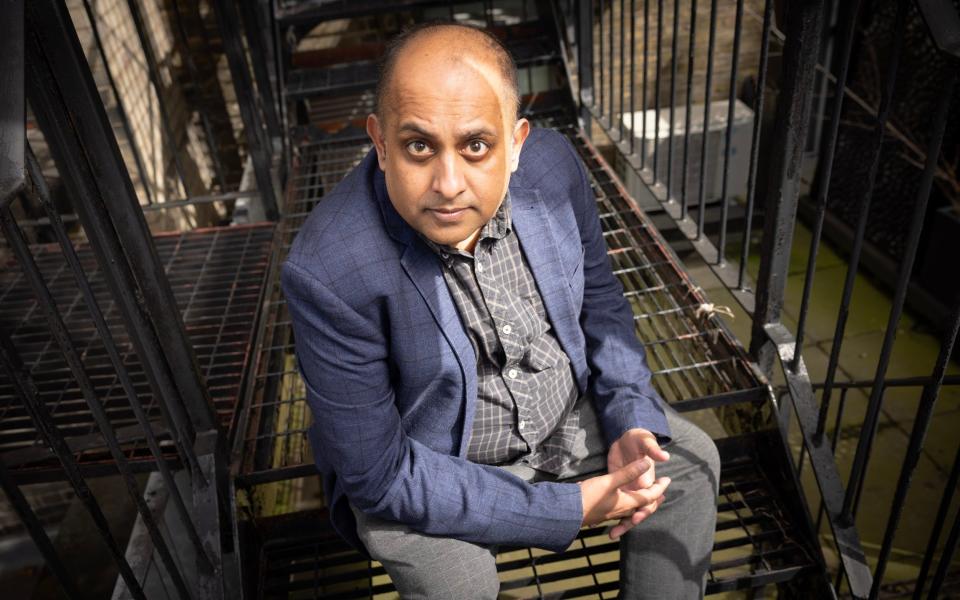Anuvab Pal: ‘If a white comedian celebrated Britishness, they’d be thought of as far-Right’

“It would be almost impossible for a white British comedian to get up on stage at the moment and celebrate Britishness without getting invitations to speak at far-Right events,” says Indian comic Anuvab Pal. “But as a foreigner, I think I have a little more permission to talk about what I love about the British culture of ‘pleases’, ‘thank yous’ and ‘sorries’; how much I relate to your repressed emotions, your laughter in the face of heroic failure and your ‘musn’t grumble’ philosophy.”
Though based in India, the loveably modest 48-year-old comedian and screenwriter has built a following in the UK, popping up in quirkily erudite spaces such as Radio 4 panel shows, QI and Andy Zaltzman’s satirical podcast The Bugle.
When we meet for a cuppa at the office of his London agent, Pal’s wincing and giggling by turns at a situation in which he’s meant to promote his imminent stand up tour, The Department of Britishness. “In Mumbai [where he lives with his second wife] there’s a very ‘can-do’, American-style self-aggrandising culture now,” he shudders. “Comics come off stage and start posting about their great gig on Instagram. I’m more at home in British comedy clubs where people come off stage with a shrug and say, ‘That didn’t go as badly as I expected’.”
Pal traces his love of a particular kind of “polite, eccentric” Britishness back to his upbringing in 1980s Calcutta (renamed Kolkata in 2001) in West Bengal. Slipping effortlessly into history teacher mode, he reminds me that India’s seventh largest city “was entirely a British creation. It was a malarial swamp. The Mughals had their palaces much further inland. But the British said they wanted to set up a trading port. After Indian Independence in 1947, Delhi became the capital, Mumbai became the commercial capital and Calcutta seemed to go on existing purely for the whims and fancies of the old empire. In the 1960s it also absorbed influences from Cuban-style communism. So it lives on nostalgia, with people talking about cricket and doing their cryptic crossword puzzles on Edwardian verandahs.”
Consequently, Pal’s education was “based on an old-fashioned British curriculum with a socialist George Bernard Shaw-ish slant. We studied Shakespeare at school and read Agatha Christie and Sherlock Holmes for fun. It wasn’t until I left home I realised that people in other parts of India weren’t reading those stories…” He sighs. “It wasn’t until I first came to Britain that I found myself looking for pockets of Downton Abbey England and realising that it may never have existed. Meantime in Calcutta I heard that a troop of musicians singing PG Wodehouse songs in cravats had sold out the theatre!”
Not that he is any defender of the British Empire – as anyone who saw his wry appearance in Al Murray’s TV series Why Does Everyone Hate the British Empire? will recall. Pal is aware aware of the “awful things” that were done. He tells me his English neighbour in Mumbai is now “making a very good living playing British villains in Indian dramas about the Empire. Every day I watch him go off to work in a different red coat, as Major Clive Something or Colonel Clive Something else rehearsing lines like: ‘Murder the Indians!’ and ‘We will divide and rule this terrible country!’”

Pal suspects that part of the reason the culture wars are so fierce now is “because for a long time people [in Britain] were in denial about the darker side of empire and pretended it was all croquet”. But he believes that “we do need to accept the history that happened and find the nuance, because not everything was good or bad. Just as the characters in that old Monty Python sketch had to acknowledge what the Romans did for them, so I can imagine five Indians making a similar list [about the Brits]: the railways, the court system, gin and tonic…” He also suspects that Brits spend more time arguing about the rights and wrongs of empire than Indians who have “simply moved on. In Kanpur, for example, there’s a huge statue of Major General Henry Havelock – who ransacked the city to win it back for the British Empire. There’s no talk there about pulling the statue down, no culture war. It’s an important city landmark and nobody really cares who he was so they recently repainted him. Meantime there’s a big debate about the statue of the same man in Trafalgar Square, because of what he did in India.”
This doesn’t mean Pal has no time for such debates. In fact, he thinks it’s to our country’s credit that we have a nagging conscience about our history and care about how we are regarded around the world. Having worked and studied in America, he was astonished by how little awareness Americans seem to have about their reputation abroad. It was while working as a business reporter for Reuters in the US that Pal began writing comedy.
“I’ve always enjoyed British comedies – like Fawlty Towers, Alan Partridge and The Office – featuring characters who constantly fail and don’t understand why they’re failing. I also loved Spinal Tap. So I made my own mockumentary [Loins of Punjab Presents, 2007] about a group of Indians in New Jersey who’d been inspired by American Idol to have their own singing competition. I was tickled by the idea of this all-consuming desire to win – by cheating and treachery – such a tiny competition in a tiny hotel.” His 2009 film The President is Coming was inspired by a real news story about India’s competition to select representatives of “the New Indian” to meet president George W Bush on his 2006 state visit. He cracks up as he explains: “I made up my version, but in real life it turns out there was an exam and two physical rounds! Delicious, right?! What were they looking for? Somebody more Indian, more American…?”
When London’s Comedy Store opened a venue in Mumbai, Pal decided to give stand-up a whirl and found he enjoyed it. “I’m actually more comfortable talking about history to audiences in the darkness than I would be having heart-to-hearts with two or three people over a drink,” he says. “But, as a big fan of Susie Izzard – who I saw doing a terrific set about Charles I in Hindi – I do realise that the best comedy is truthful and personal and I’m not very good at telling my truth.”
Although Pal prefers to “hide behind history and cultural observations” in his stand-up, in our conversation he’s happy to share personal anecdotes he’s never told on stage. “When I was getting divorced from my first wife, the guy ahead of us in the queue was a big TV star, famous for playing Lord Krishna. I mean, Lord Krishna is supposed to be the almighty, all-knowing God, you’re supposed to be able to see the whole universe if he opens his mouth. I thought: if Lord Krishna is getting divorced what hope do the rest of us have? I asked him: Lord Krishna, what advice do you have for mere mortals? He said: ‘Don’t let your wife read your text messages.’”

Pal says that the rise of the comedy scene in India has been “extraordinary”. Most isn’t in English. But it travels well. Last year, Zakir Khan – who performs in Hindi – became the first non-Anglophone comic to sell out the Royal Albert Hall, while Mumbai-born and based Urooj Ashfaq (who performs in English) won the Best Newcomer Award at that year’s Edinburgh Fringe.
Within India, Pal acknowledges that self-expression is “tricky” under the Modi regime. “He’s looming over all art and culture in India, just like any quasi-dictator. There’s an eerie atmosphere. I imagine it was the same doing comedy in Libya under Gaddafi.” Pal sighs and says Indians today are living under “a gentle fascism. It is fascism, but it happened so slowly people didn’t realise. You notice it in the smaller, subtle things, the visit from the income tax man.” Does Pal feel unable to speak out in his stand-up sets? “I am careful about what YouTube videos I post, but I don’t think his people would come after a comedian with a British fanbase. I’m too small for them, I think, for anything I say to interfere with their voting base. But they’d come for a Hindi comedian with 20 million followers.”
When he travels, Pal admits journalists always want to know why he doesn’t talk more about Modi and Hindu nationalism. “Some people think I’m chickening out,” he shrugs. “Maybe I am avoiding something. That would be very British of me, wouldn’t it!” But for now, the warm-hearted Pal just wants to lift spirits on his UK tour. As he squirms into a schoolboyish rucksack he tells me that he’s come to realise that “the Britishness I’m celebrating doesn’t have anything to do with ethnicity or nationality any more. I find it in good manners and a sense of the absurd everywhere.”
For example? “I read recently about that Crooked House Pub [in Dudley] that burned down and the campaign to rebuild it, complete with its tilted floor. In the online comments under the story, I saw a Middle Eastern reader was passionately agreeing that this wonderful, impractical building should be restored.” Pal chuckles and – very politely – opens the door for me. “I thought that was the most British thing ever.”
Anuvab Pal’s show The Department of Britishness tours the UK from May 17. Tickets: anuvabpal.com

 Yahoo News
Yahoo News 
